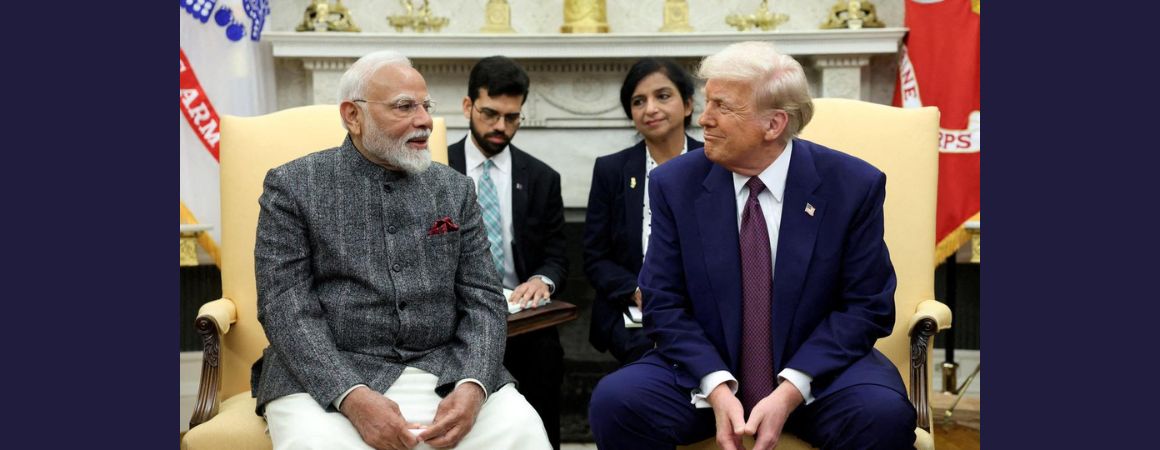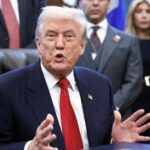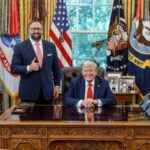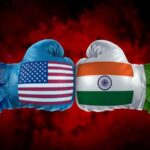Both leaders to speak soon; officials say Indian outreach to U.S. lawmakers, high-level intervention with Rubio helped with breakthrough
Trade negotiations between India and the U.S. are set to resume, President Donald Trump has announced, as he and Prime Minister Narendra Modi exchanged cordial messages on social media.
The two leaders will speak directly in the “upcoming weeks”, which could indicate a restart to relations that were ruptured over the imposition of 50% tariffs on India, demands for India to stop importing Russian oil and conflicting versions on the Operation Sindoor ceasefire.
While no date has been announced for the formal resumption of talks for a Free Trade Agreement (FTA), government sources said on Wednesday they were “still on track to meet the fall deadline for the deal”, referring to the commitment made by both leaders at their White House meeting in February.
Mr. Trump was the first to post overnight on Truth Social, four days after he told reporters at the White House that India-U.S. tensions were “nothing to worry about”.
“I am pleased to announce that India and U.S. are continuing negotiations to address Trade Barriers between our two Nations,” Mr. Trump said.
“I look forward to speaking with my very good friend, Prime Minister Modi, in the upcoming weeks,” he added, promising a “successful conclusion” for both countries.
Hours later, Mr. Modi quoted the U.S. President’s post on X, saying that he was “confident that trade negotiations will pave the way for unlocking the limitless potential of the India-U.S. partnership”.
“Our teams are working to conclude these discussions at the earliest,” Mr. Modi said, adding that he too looked forward to the call with Mr. Trump.
“We are in active dialogue with the U.S.,” Commerce and Industry Minister Piyush Goyal said at an event organised by the Federation of Indian Chambers of Commerce & Industry (FICCI) on Wednesday, adding separately that no business partnership or friendship could be “one-sided”.
Asked how the trade talks were brought “back on track”, government officials pointed to a number of initiatives by New Delhi to Washington, including by Indian Ambassador to the U.S. Vinay Kwatra, who has met nearly 30 U.S. Representatives and about 10 influential Senators in the past month, apart from think tanks, media organisations, and State department officials, even as Defence and Space exchanges continued “as normal”. India also hosted three U.S. lawmakers, including Brian Fitzpatrick, who had earlier moved a Bill calling for heavy sanctions on India for its dealings with Russia during the Ukraine war.
According to a Washington-based source, a “high-level” Indian outreach was also made to U.S. Secretary of State Marco Rubio in late August, proposing a return to the FTA negotiations. According to the source, the White House said the “ball is in India’s court”, referring to an elimination or at least a reduction in India’s import of oil from Russia.
The External Affairs Ministry declined to respond to a written request from The Hindu about the alleged outreach to Washington by a senior member of the government, but it did not deny the claim either. India has thus far rejected U.S. calls to cut Russian oil, asserting it as a “sovereign decision” based on market positions.
India’s oil importers and major public sectors undertakings (PSU) said there have been “no official directions” on future purchases from Russia, which amounted to 2 million bpd (barrels per day) in August. However a senior official in one of the top oil importing Indian companies told The Hindu that “no new orders” had been placed for Russian oil by his company in September so far.
“The oil that has so far entered the country from Russia has been those orders that were placed before the additional tariffs were imposed. The oil that will come in November will be orders placed in September,” the official, who asked not to be named, explained.
Sources also said there was still no clarity on whether Mr. Trump would travel to India for the Quad summit later this year. However, officials on both sides indicated that his likely visit to South Korea for the Asia Pacific Economic Cooperation Forum (APEC) on October 31 and November 1, where he is expected to meet Chinese President Xi Jinping, could serve as a potential precursor to a broader Asia tour that may include other countries.
The FTA talks ran into trouble after five rounds over access to Indian markets for U.S. agriculture and dairy products, and a sixth round of talks in Delhi was called off by the U.S., as it imposed an addition 25% penalty tariffs on India for buying Russian oil. Meanwhile Mr. Trump and Mr. Modi also fell out over the issue of the May 10 ceasefire between India and Pakistan, which came to a head over a phone call on June 17. According to the External Affairs Ministry, Mr. Modi clearly told the U.S. President that he had no role in “mediating the ceasefire” as he claimed. The White House issued no readout of the call, further underlining the tensions.
Trump, Modi indicate India-U.S. trade talks may resume
Both leaders to speak soon; officials say Indian outreach to U.S. lawmakers, high-level intervention with Rubio helped with breakthrough
Trade negotiations between India and the U.S. are set to resume, President Donald Trump has announced, as he and Prime Minister Narendra Modi exchanged cordial messages on social media.
The two leaders will speak directly in the “upcoming weeks”, which could indicate a restart to relations that were ruptured over the imposition of 50% tariffs on India, demands for India to stop importing Russian oil and conflicting versions on the Operation Sindoor ceasefire.
While no date has been announced for the formal resumption of talks for a Free Trade Agreement (FTA), government sources said on Wednesday they were “still on track to meet the fall deadline for the deal”, referring to the commitment made by both leaders at their White House meeting in February.
Mr. Trump was the first to post overnight on Truth Social, four days after he told reporters at the White House that India-U.S. tensions were “nothing to worry about”.
“I am pleased to announce that India and U.S. are continuing negotiations to address Trade Barriers between our two Nations,” Mr. Trump said.
“I look forward to speaking with my very good friend, Prime Minister Modi, in the upcoming weeks,” he added, promising a “successful conclusion” for both countries.
Hours later, Mr. Modi quoted the U.S. President’s post on X, saying that he was “confident that trade negotiations will pave the way for unlocking the limitless potential of the India-U.S. partnership”.
“Our teams are working to conclude these discussions at the earliest,” Mr. Modi said, adding that he too looked forward to the call with Mr. Trump.
“We are in active dialogue with the U.S.,” Commerce and Industry Minister Piyush Goyal said at an event organised by the Federation of Indian Chambers of Commerce & Industry (FICCI) on Wednesday, adding separately that no business partnership or friendship could be “one-sided”.
Asked how the trade talks were brought “back on track”, government officials pointed to a number of initiatives by New Delhi to Washington, including by Indian Ambassador to the U.S. Vinay Kwatra, who has met nearly 30 U.S. Representatives and about 10 influential Senators in the past month, apart from think tanks, media organisations, and State department officials, even as Defence and Space exchanges continued “as normal”. India also hosted three U.S. lawmakers, including Brian Fitzpatrick, who had earlier moved a Bill calling for heavy sanctions on India for its dealings with Russia during the Ukraine war.
According to a Washington-based source, a “high-level” Indian outreach was also made to U.S. Secretary of State Marco Rubio in late August, proposing a return to the FTA negotiations. According to the source, the White House said the “ball is in India’s court”, referring to an elimination or at least a reduction in India’s import of oil from Russia.
The External Affairs Ministry declined to respond to a written request from The Hindu about the alleged outreach to Washington by a senior member of the government, but it did not deny the claim either. India has thus far rejected U.S. calls to cut Russian oil, asserting it as a “sovereign decision” based on market positions.
India’s oil importers and major public sectors undertakings (PSU) said there have been “no official directions” on future purchases from Russia, which amounted to 2 million bpd (barrels per day) in August. However a senior official in one of the top oil importing Indian companies told The Hindu that “no new orders” had been placed for Russian oil by his company in September so far.
“The oil that has so far entered the country from Russia has been those orders that were placed before the additional tariffs were imposed. The oil that will come in November will be orders placed in September,” the official, who asked not to be named, explained.
Sources also said there was still no clarity on whether Mr. Trump would travel to India for the Quad summit later this year. However, officials on both sides indicated that his likely visit to South Korea for the Asia Pacific Economic Cooperation Forum (APEC) on October 31 and November 1, where he is expected to meet Chinese President Xi Jinping, could serve as a potential precursor to a broader Asia tour that may include other countries.
The FTA talks ran into trouble after five rounds over access to Indian markets for U.S. agriculture and dairy products, and a sixth round of talks in Delhi was called off by the U.S., as it imposed an addition 25% penalty tariffs on India for buying Russian oil. Meanwhile Mr. Trump and Mr. Modi also fell out over the issue of the May 10 ceasefire between India and Pakistan, which came to a head over a phone call on June 17. According to the External Affairs Ministry, Mr. Modi clearly told the U.S. President that he had no role in “mediating the ceasefire” as he claimed. The White House issued no readout of the call, further underlining the tensions.






NO COMMENT